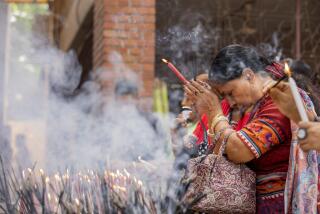India’s Taj Mahal City Now Ghost Town
- Share via
AGRA, India — The Taj Mahal city of Agra has become a virtual ghost town after at least 11 people were killed there in the Hindu-Muslim violence gripping India.
More than 300 people have died across the nation since Dec. 7 in violence sparked by a dispute over a shrine in Ayodhya in the northern state of Uttar Pradesh. Officials describe the violence as among the worst since India gained independence 43 years ago.
In Agra, also in Uttar Pradesh, police spokesman M. P. Solanki said Monday that at least 11 people have been killed and 28 injured in Hindu-Muslim clashes since Friday.
Soldiers, paramilitary units and police patrolled the streets and stood guard around the Taj Mahal, closed since the fighting broke out. The soldiers turned back two Australian tourists who tried to enter the grounds of the sparkling marble masterpiece of 17th-Century Muslim architecture.
The huge wooden gates were shut, and an official said it was too dangerous to allow anyone inside the Taj Mahal, built by the Muslim ruler Shah Jehan in memory of his wife.
The official appeared to be referring to fears that Hindu extremists might make a target of the Taj Mahal, one of the few popular destinations left for tourists visiting India.
An indefinite curfew and heavy security kept most people off Agra’s streets, and nearly every shop was boarded up.
The Hindu militants are campaigning to claim the Ayodhya site as the birthplace of the Hindu god-king Lord Rama. They say Muslim invaders razed a temple on Lord Rama’s birthplace in 1528 to build a monument to the Islamic conquest of India.
In New Delhi, Prime Minister Chandra Shekhar said that he is prepared to use “any amount of force needed” if dialogue fails to halt the Hindu-Muslim riots.
“Certain people are trying to create trouble. They are exploiting this thing,” he said in an interview with Associated Press.
The sectarian violence helped bring down his predecessor, Prime Minister V. P. Singh, about a month ago. Parliament then gave Shekhar a vote of confidence to form a new government.
He said Monday that he is optimistic that dialogue can defuse the sectarian rivalries and fears that have spurred Hindus and Muslims to murderous riots in several cities. Mobs have slaughtered infants with axes, burned people alive and lynched passengers on passing trains.
“It is very difficult to grapple with the situation,” Shekhar said, adding: “We want to deal with the situation with restraint and patience.”
Shekhar, a veteran politician, tends to speak in political platitudes in public. But he has a reputation for tough-minded effectiveness when it comes to wheeling and dealing in private with his friends and foes.
Shekhar said his willingness to make political deals and engage in dialogue should not be interpreted as a sign of weakness.
On Friday, he said he soon will present a new peace plan for Punjab, where Sikh extremists have killed more than 3,100 people this year, the highest annual toll since they launched their separatist campaign in 1982.
More to Read
Sign up for Essential California
The most important California stories and recommendations in your inbox every morning.
You may occasionally receive promotional content from the Los Angeles Times.













